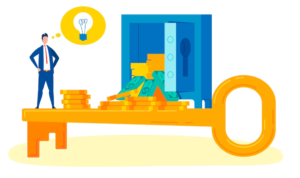Choosing a bank may greatly affect your finances. With so many alternatives, picking the one that meets your requirements and goals is crucial. This blog post will help you choose between convenient online banking, attractive interest rates, excellent customer assistance, and strong security.
In this post, we will discuss the important elements, offer advice, and help you choose a bank that enables you to succeed financially. Let us explore how to pick a bank. Click here.
Needs and Goals Assessment
Financial needs and goals understanding:
Before picking a bank, know your financial requirements and aspirations. Remember to ask yourself:
What are your main banking needs? Should you open a checking, savings, business, or high-yield savings account?
What are your short- and long-term financial goals? Want to save for a house down payment, pay off debt, or start a business? Remembering this can help you choose a bank with goods and services that support your goals.

Join Hiatus to manage your money.
Start Saving Now
Finding needed financial services:
After determining your objectives and goals, evaluate which banking services are necessary for your financial journey. Considerations include:
Payment methods: Do you prefer cheques, electronic payments, or both? Choose a bank with safe, easy payment choices that suit your needs.
Online banking: Are you comfortable managing money online? If so, choose online banks with bill payment, financial transfers, and real-time transaction monitoring.
Will you require loans, credit cards, or lines of credit? Find a bank with reasonable lending rates, good credit card conditions, and flexible credit alternatives if necessary.
Small business banking: Entrepreneurs and company owners should explore small business banks. Look for business accounts, merchant services, and business loans to help your firm.
You may limit your alternatives by evaluating your objectives, goals, and the banking services you need, and choosing institutions that meet your financial goals.
aspirations for luxury homes
Options for Banking
Research the different banks and financial organizations after deciding what banking services you need. Three types of banks and financial institutions:
Traditional banks have physical branches and are well-established. They often provide checking, savings, loans, mortgages, and investment options.
Online banks are digital-only. They usually have cheap fees, attractive interest rates, and 24/7 account access via user-friendly websites or mobile apps.
Credit Unions: Members own nonprofit credit unions. Unlike traditional banks, they offer customized service, competitive rates, and lower costs. However, credit unions may have limited ATM and branch networks.
investigating banking alternatives
Key Considerations:
1. Account Types and Services
Account types and services are important when choosing a bank.
Checking accounts: Review features and costs. No monthly maintenance costs, free ATMs, online bill payment, and overdraft protection are desirable.
Savings Accounts: Check interest rates and minimal balances. Look for competitive rates and savings growth alternatives.
Specialist Accounts: Your financial goals may necessitate specialist accounts. High-yield savings, money market, CD, and retirement accounts are examples. Assess these bank services.
2. Fees and Interest
Bank interest rates and fees might affect your experience. You should know these things before opening an account:
Savings Account Interest Rates: Compare bank savings account interest rates. Competitive rates help your funds grow.
Loan Interest Rates: If you need a mortgage, auto loan, or personal loan in the future, compare bank interest rates and terms. Lower interest rates save money over time.
Fee Plans: Review account and service fees carefully. Monthly maintenance, ATM, overdraft, and transaction fees are examples.
3. Convenience and Access
Your banking experience depends on convenience and accessibility. Some things to consider:
Branch locations: If you desire in-person banking, examine the distance to your home, business, or frequent destinations. A nearby branch might save you time while transacting or getting help.
ATM Network: Check the bank’s ATM network for free local ATMs. Easy ATM access helps prevent out-of-network costs.
Mobile Apps and Online Banking: Assess the bank’s mobile and internet banking. Ensure they are user-friendly, provide the required tools, and offer strong online transaction security.
4. Reputation and Customer Service
Some customers pick a bank based on customer service and reputation. It would be best to examine customer reviews and testimonials to assess the consumer experience. Consider customer service quality, responsiveness, and issue resolution comments.
You should also check the bank’s reputation and finances. Check the bank’s history and accolades for outstanding service. Avoid banks you can not trust with your money.
5. Safety and privacy
Bank security and privacy are top priorities. Ask about encryption, multi-factor authentication, and fraud detection at the bank. This will ease your decision to use that bank.
See its privacy policy to learn how the bank handles and protects your data. Ensure they have privacy and regulatory compliance practices.
making final choice
You must assess the benefits and downsides of each shortlisted bank. This will help you choose a bank. The positives may outweigh the negatives, making creating an account with that financial institution worthwhile.
Review your needs: Review financial objectives, needs, and priorities. Choose the bank that best meets your needs and gives the services and features you value.
Consider the advantages: Check each bank’s benefits. High-interest savings accounts, cheap fees, excellent customer service, sophisticated online banking platforms, and customized services are notable characteristics.
Consider drawbacks: Consider each bank’s downsides. This might include fewer branches, ATMs, increased fees, or tougher account eligibility restrictions.
finalizing decision
Taking Action: Opening Account
After choosing the right bank, open an account. Following these steps will streamline account opening:
Gather documents: Banks have different paperwork requirements. Identification (passport or driver’s license), proof of address (utility bill or bank statement), and Social Security or Tax Identification number are most often sought.
Visit the bank’s website or branch: Open an account online or in a branch, depending on the bank. Visit the bank’s website to create an account or make a branch appointment.
Complete the application: Finish the account application with proper information.
Fund your account: Choose an account type and fund it with the needed initial deposit. Transfer money from another bank account or deposit cash or a cheque.
Review terms and conditions. Review your new account terms and conditions carefully. Check minimum balances, fees, interest rates, and promotions.
Set up extra services like online bill payment, direct deposit, and mobile banking during account opening.
After opening your account, check your account number, routing number, and internet banking login credentials.
Account activation: Follow bank instructions to activate the account. Verifying identification, establishing internet access, or starting debit cards or checks may be required.
These procedures and the bank’s criteria will let you create a new account and use your selected bank’s services and advantages.
Finishing Up
Choosing a bank involves thought. Finding a bank that meets your financial goals requires study, comparison, and prioritization. For people with many bank accounts, personal finance applications can help organize your funds. Hiatus lets you link all your bank accounts to manage your money. You can confidently work your funds and achieve financial success with the proper bank.
FAQ:
Choosing the correct bank is one of the most important personal financial decisions. Your banker shapes your financial future, not just stores your money. Welcome to “Choosing the Right Bank: Your Key to Financial Success,” where we answer commonly asked questions to simplify selecting the right financial partner. Whether you are an experienced investor or just starting, recognizing this decision is crucial. Let us navigate banking and achieve financial success together.

What Bank Is Right for Me?
Assessing your financial requirements and priorities is essential to choosing a bank. Consider whether you need savings, checking, or investment accounts. Assess the bank’s costs, interest rates, and online and branch accessibility. Consider customer service and the bank’s distinctive features. Your ideal bank supports your financial objectives and lifestyle with the right tools.
What Are Your Bank Selection Criteria?
It would be best if you considered several aspects before choosing a bank. Assess your account type, fee, and interest rate selections. Consider branch convenience and Internet banking. A good banking experience depends on customer service and the bank’s reputation. Consider your long-term financial goals and whether the bank offers mortgage help or investment choices. Your optimal banking partner depends on how important these things are.
Why Does Bank Choice Matter?
Your bank choice affects your finances. It affects savings, interest, costs, and fund accessibility. The proper bank sets you up for financial success by meeting your requirements and goals. Choose the incorrect bank, and you may incur fees, have poor interest rates, and have a bad banking experience. Your bank is a financial partner that may help or hurt your financial performance.
What is Most Important in Bank Account Selection?
Key things must be considered while choosing a bank account. Interest rates affect your savings growth over time. Check the account’s monthly maintenance, ATM, and overdraft fees. Assess ATM and Internet banking accessibility. Quality customer service ensures quick and effective problem resolution. Check the account’s mobile banking, budgeting, and account management functions. A thorough assessment of these aspects guarantees that your bank account meets your financial needs and aspirations.